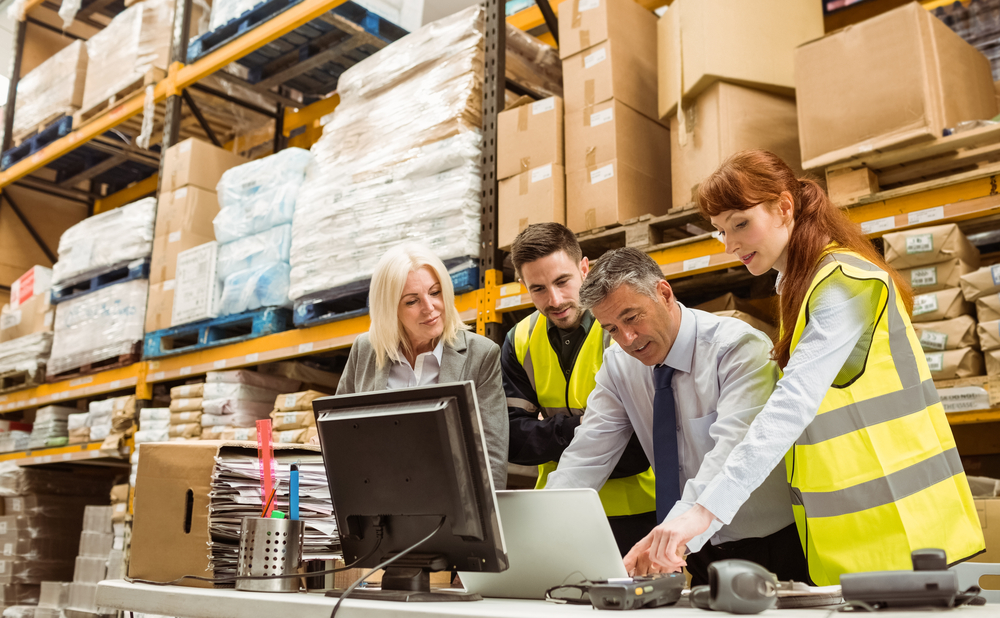The Power of Emergent Transportation and Logistics Technologies
Technological innovation is catalyzing transportation and logistics evolution. Robotics, automation, artificial intelligence (AI), augmented intelligence (IA), Internet of Things (IoT), cloud computing, and seamless data transfer improve product visibility, productivity, and the customer experience. From commercial freight solutions to “last mile” delivery, advanced technology services evolve logistics operations throughout the industry.
Is your transportation logistics business ready for digital evolution? The future of transportation and logistics is here, led by connected technologies that have multiple benefits for supply chain and logistics partners. Some logistics technology solutions driving this evolution include:
1. Robotics and Automation Tools
Innovations in robotics and automation promise to increase warehouse efficiency by replacing labor-intensive activities such as product picking and packing. Modern systems in operation today can handle hundreds of picks per hour, and identify and manage objects in varying positions and orientations.
Today, the product sizes and weights in the pharmaceutical industry dictate the operating systems used. Until advanced systems are developed, robot arms and automated guided vehicles support human workers to increase warehouse productivity and provide efficient transloading solutions.
2. Internet of Things (IoT)
IoT sensor technology is emerging as a critical asset for tracking shipments and achieving end-to-end visibility on the supply chain. In addition to improved monitoring capabilities, IoT produces critical data that enables managers to optimize operations and monitor equipment effectively.
3. 5G Connectivity
With multi-gigabit peak rates, ultra-low latency, and massive data capacity, 5G mobile networks amplify the potential of IoT technology throughout the supply chain. In addition to transforming logistics, 5G has the potential to create “smart” cities by connecting billions of devices within residential, commercial, and industrial environments.
4. Big Data Analytics Applications
Online activity produces massive amounts of data as more businesses, governmental organizations, and individuals come online; due to its size, complexity, and velocity, this is referred to as big data. Experts from Forbes estimate the big data market will top $225B in the coming decade. To process the full scope of this data, applications leveraging sophisticated algorithms and processing power are required to maximize its full potential.
Some specific areas of supply chain management that have benefited from advanced analytics applications include:
- Inventory monitoring and management
- Quality control, product and temperature monitoring
- Warehouse operations and equipment maintenance
- Delivery times for supply chain partners and consumers
In addition, advanced analytics applications provide managers with critical insights that refine long-term planning activities and pivot their strategy in response to rapidly changing market conditions.
Talk to an Expert
Is Your Business Ready For Digital Evolution?
AVIO’s award-winning API management and consulting have increased speed, improved visibility, and enhanced security for some of the world’s leading logistics companies.
Is your business a good fit? Contact an AVIO Consulting expert to get started.
{{cta(‘b4b92fd3-6974-4393-802b-3ca4fc4050ce’)}}
5. Modern Logistics and Transportation Software
Leading software technology in logistics and supply chain management is optimizing operations for freight forwarding companies, consumer delivery businesses, and partners in the container shipping sector. Integration between systems with APIs is critical to maximizing the potential of transportation technology services. Some specific benefits include:
- Improved data connectivity between segments
- Easier coordination of complex shipping routes
- Accelerated delivery times
- Optimized digital tolling solutions
- Reduced security breach risks
Advances in transportation and logistics are made possible by cloud computing — an essential component of the supply chain and logistics technology stack. Without it, system integration, efficient data sharing, and seamless communication would be impossible.
6. Artificial Intelligence, Augmented Intelligence, and Machine Learning
Artificial Intelligence (AI) and Machine Learning (ML) research has led to innovative tools and software that replicate human intelligence in the digital environment. Some applications of this technology include:
- ML algorithms that refine supply chain planning
- Autonomous vehicle research
- Dynamic asset maintenance
- ML applications that use forecasting to optimize warehouse management and minimize disruption
- Predictive analytics that aid demand forecasting and project environmental impacts
Despite the rapid progress of AI, not all tools can replace the creative and intellectual potential of human managers. To fill in the gaps, applications that leverage Augmented Intelligence (Intelligence Amplification or IA) combine human experience with the algorithmic power of AI. Benefits include unprecedented levels of productivity and efficiency and critical insights that enable managers to make effective decisions.
7. “Smart” Delivery Systems
Logistics companies are currently using Ride-sharing applications like Uber to buy and sell delivery services. Businesses can use these auction systems to match loads with available capacity, simplify rate negotiations, and quickly pay for services. In addition, “last mile” transportation companies are leveraging crowd-sourcing applications to engage local operators, taxi drivers, and neighborhood members to deliver parcels as part of their regular commute.
Learn How AVIO’s API-Led Approach Overcomes Logistics Challenges
While the path to digital evolution leads to operational and financial benefits, many issues arise along the way. Get an inside look into how AVIO addresses critical challenges for leading logistics businesses by downloading our on-demand webinar, Challenges Facing the Transportation and Logistics Industry — And How MuleSoft Can Solve Them.

Jeff Bean
Lead Solution Engineer, MuleSoft

Mike Slack
Vice President of Sales, AVIO Consulting
Watch Jeff and Mike as they discuss how MuleSoft integration solves critical challenges, discover new use cases, and answer audience questions.

